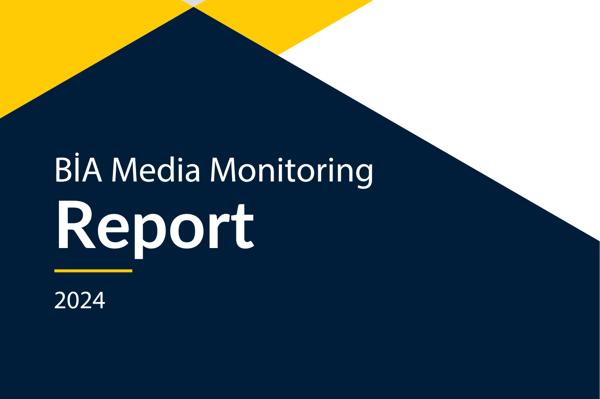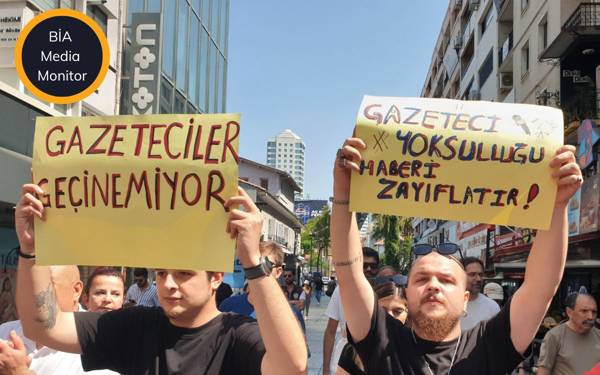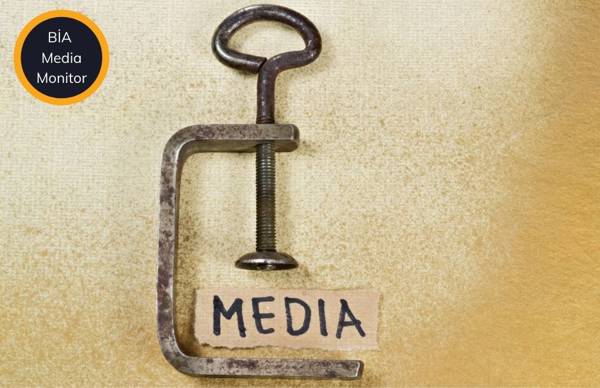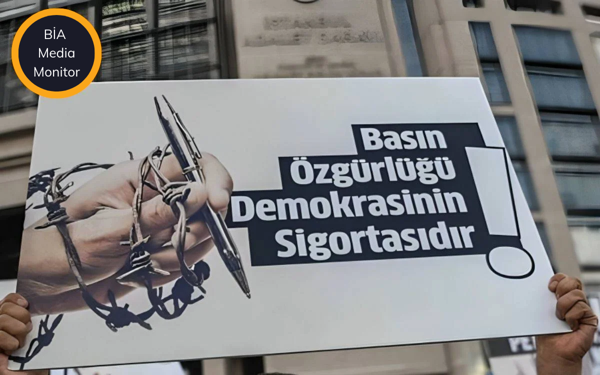Womens Representation in Media Discussed
About 71 reporters and NGO representatives, most of whom were women, found the opportunity at the seminar to evaluate reporting on women's issues, discuss the impact of the women's movement on women's rights, share their experiences, and get information on the Civil Code, Penal Code, International Agreements, women's rights and crimes against women.
Besides attendants from Canakkale, local media employees and representatives from women's organizations located in the provinces of Bursa, Balikesir, Bilecik, Yalova, Tekirdag, Edirne and Istanbul, participated in the seminar.
Kerestecioglu: Law is important but there is need for implementation and media monitoring
After Fugen Ugur, the deputy coordinator of BIA², delivered the keynote speech on the project, lawyer Filiz Kerestecioglu made a presentation on "National and International Regulations on Women's Rights."
Lawyer Kerestecioglu said crimes against women, such as rape, were considered to be crimes not against women, but against the general morals of the society in the past. She argued that women were seen as beings without an identity or personality under the former Penal and Civil Codes.
She backed up her argument by reminding participants of the fact that women were forced to marry their rapists and that heavier penalties were given out to those who kidnapped a married woman as opposed to a single woman. Kerestecioglu said that the Civil Code No: 4721 adopted on November 22, 2001 put an end to such practices.
The lawyer added that article 194 of the new Civil Code grant the couples equal rights on the family residence. Only property acquired after January 1, 2002 can be shared by husband and wife under the Civil Code, she said.
Lawyer Kerestecioglu said that article 199 of the Civil Code allows women to demand that the man's power of disposal is lifted. A woman may demand that the man's authority is limited through a judge decision, due to his irresponsible behavior such as gambling. She added that the real value of house production is now recognized.
Kerestecioglu said however, that it is a contradiction that only property acquired after 2002 can be shared by husband and wife. She also talked about regulations on crimes against women and children. Lawyer Kerestecioglu said rape in marriage is regarded as a crime but criticized the fact that all such regulations are implemented if there is complaint.
"It is possible that an individual, in that psychological trauma situation, withdraws her complaint," Kerestecioglu said. "We regard this as a danger."
She stated that women, in cases of domestic violence, may demand that measures are taken through court decision or that an investigation is launched under Law on the Protection of the Family No: 4320.
Kerestecioglu also talked about international documents such as the International Convention on the Elimination of all forms of Discrimination Against Women. The lawyer, who also touched on the media's role, emphasized that the Sile case, which has been going on for four years, is not being covered by the media anymore. She argued that effective journalism benefits the common good.
Koker : No women in media management positions
Professor Doctor Eser Koker of the Communications Department of the Ankara University, made a presentation on "Media and Women's Representation, and Violations of Women's Rights in the Media." He argued that the fact that there are no women among the owners or bosses of the media and that there are very little women in the management positions, increase violations of women's rights in the media.
He said that although there is an increase in the number of women journalists, which is seen as the job of the 19th century, the number is still far from being adequate.
According to Professor Koker, the feminist movement, which has been on the increase in the west since the 1960s and which has targeted media as a channel which reproduces social inequality, has had a role on women's increased participation in the media.
Prof. Koker said although the media is becoming more and more feminized, there still are not enough women in the management rooms.
He said that a study they conducted as the Communication Department of Ankara University in 1994 on violence against women, was reflected by the media in such a way that made it seem like only the students, actresses and singers are faced with violence. Koker added that when they updated the study in 1998, the media focused only on Natashas. He said such reporting should be questioned.
"The media, which has assumed the role of being the cement of nationalization, is losing its impartiality and objectivity," argued Koker. "The media can only regain impartiality by the equal representation of different social layers."
Koker also criticized the fact that there are no women members in the Radio and Television Higher Board (RTUK). He argued that women in the media are portrayed as either victims, offenders or a representatives of bad intentions. He said the media portrays women who love their husbands or who hold management positions. Others living under different conditions are not portrayed to the public, Koker argued.
"When we think about women, we shouldn't think of an innocent or an evil person," said Koker, using some newspaper clippings as examples. "The nature of the report must be questioned for equality. We can create a second nature by being skeptical."
Dogan: We criticize women's misrepresentation and inadequate representation in the media
Selen Dogan spoke about her experience at "Ucan Supurge" (Flyin Broom), which is a non-governmental organization engaging in women's issues. Dogan said that the "Local Women Reporters' Network" project, which was launched in March 2003, still continues in 12 provinces with 12 local women reporters.
She said their point of departure is the annoyance arising from the misrepresentation and inadequate representation of women in the media. She said they also disapprove the fact that women mostly are portrayed on the third pages of newspapers as victims of violence such as murder or rape, and as subjects of desire.
Dogan underlined the need for reaction against the mainstream media, which enforces discrimination against women, which portrays them within traditional forms, and which reproduces violence. "We have set off with the aim of reporting from a woman's point of view, to hear and make heard the voices of women, and to create an 'alternative women's media,'" said Dogan. "This is how the Local Women Reporter's Network was established."
Reporting workshop with Dr. Aksu Bora
Dr. Aksu Bora from the Research and Implementation Center for Women's Problems at the Ankara University, held a workshop on "reporting on Violations of Women's Rights and news monitoring."
The journalists worked on and discussed seven different reports. After the workshop, BIA² Deputy Coordinator Ugur made a short presentation on women's position in journalism in Turkey and in the world. He used case studies and numbers in his presentation.
Ugur said that only about 30-35 percent of journalists in the world are women. He stated that women complain about sexual harassment and economic exploitation at workplace. He added that women in the local media are not represented enough.
Yildirim criticized Hurriyet's campaign
Nermin Yildirim from Pazartesi (Monday) magazine said all employees of the magazine, except full-time employee Beyhan Demir, have other jobs besides journalism.
Yildirim said that she started writing for the magazine after it had been closed for 18 months. The mainstream media feels the need to get the magazine's views on reports on issues such as sexual violence and incest, according to Yildirim.
She added that they were acquitted in three trials they stood for publishing articles on the sexual fantasies of women. Yildirim said they also stood trial at the State Security Court (DGM) in the past for covering the incidents at the Burdur Prison and targeting the prison manager.
Yildirim also criticized the Domestic Violence Campaign by the daily Hurriyet newspaper. She said that a writer of Hurriyet orally attacked Eren Keskin, one of the directors of the Human Rights Association (IHD). She said the attack was of sexual nature.
Yildirim also touched on the bad treatment of lesbians and homosexuals and added that they supported such groups.Eyuboglu talked about the Press Law and TCK
Lawyer Meric Eyuboglu of the Istanbul Bar Association talked about the BIA ² Legal Support Desk. He said attention has to be paid to the regulations in the Press Law and the new Turkish Penal Code (TCK) concerning those younger than 18.
Lawyer Eyuboglu explained article 19 of the Press Law titled, "Affecting justice," article 20 titled, "Encouraging sexual attacks, murder and suicide," and article 21 which envisages not revealing the identity of the offender or the victim, if he/she is under 18. He spoke about parallel regulations in the TCK and other articles that may be used to limit the freedom of communication or expression.
Kurkcu spoke about Bianet and their project schedule
BIA² Project Coordinator Ertugrul Kurkcu, who gave information on the bianet Web site, said that the part of the project on women's reporting will be completed with the Izmir and Adana seminars.
He added that a new series of seminars on Children's Rights Reporting will be launched in the near future. Kurkcu said there would soon be information on the bianet Web site on the international alternative media forum to be held in late April as part of the project.
He reminded local reporters that they could feed bianet with reports from their regions as well as using reports from the bianet Web site. The two-day seminar ended with reporters' evaluations of, and recommendations on the program. (EO/EA/YE)
BİA MEDIA MONITORING REPORT 2024
The government made journalists' lives a living hell in 2024

BİA MEDIA MONITORING/OCTOBER-NOVEMBER-DECEMBER 2024
Truth concealed through repression from all sides targeting journalists

BİA MEDIA MONITORING REPORT
Just silence the journalist, and I won't touch you!

BİA MEDIA MONITORING APRIL-MAY-JUNE 2024
Journalists are on the target and have no legal security anymore!

BİA MEDIA MONITORING REPORT
The era of 'judicial control' confinement and torture in journalism









